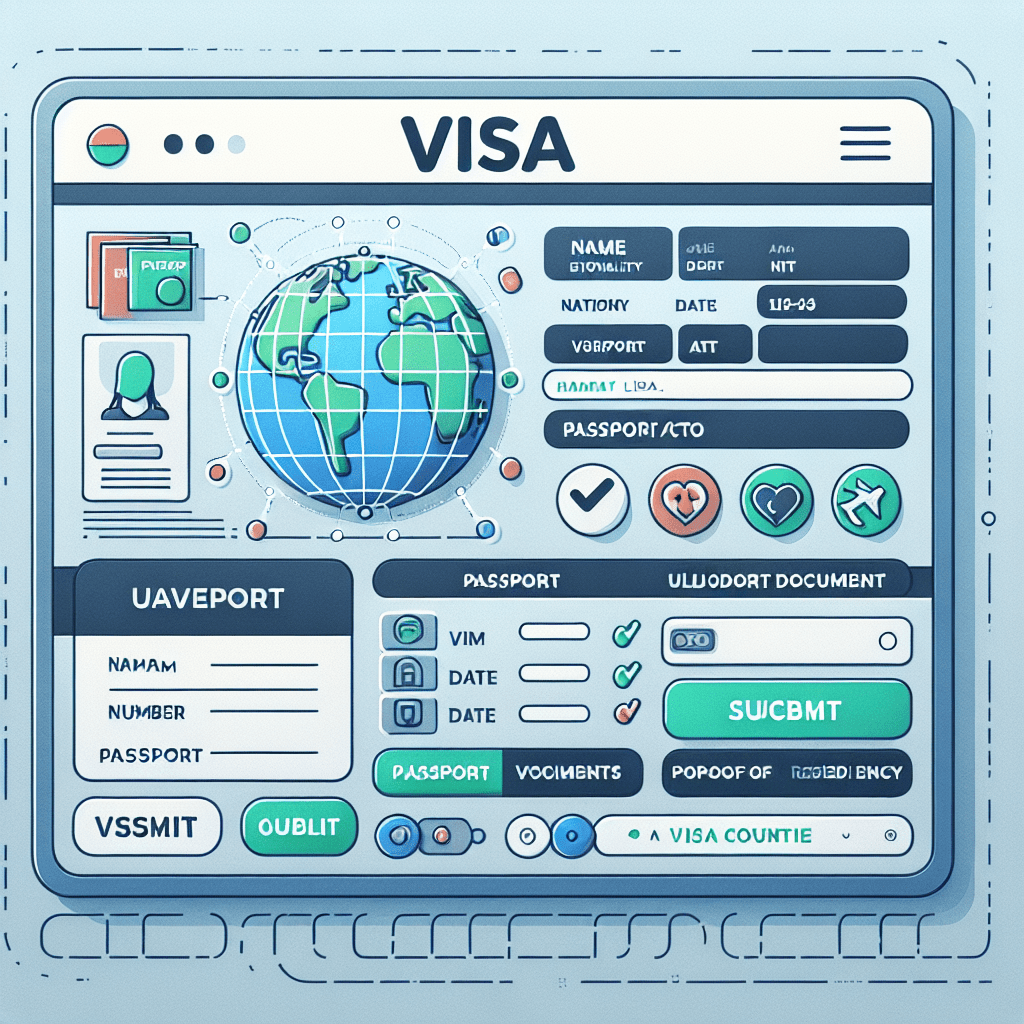Introduction
Overview of electronic visas
Electronic visas, also known as e-visas, are digital travel authorizations that allow travelers to enter a specific country for a designated period. The electronic visa process has revolutionized the way individuals apply for travel permits, making it more convenient and efficient.
Importance of understanding the electronic visa process
Understanding the electronic visa process is crucial for travelers who wish to visit a foreign country. By familiarizing themselves with the requirements and procedures involved in obtaining an electronic visa, individuals can ensure a smooth and hassle-free travel experience.
Purpose of addressing frequently asked questions about electronic visas
The purpose of addressing frequently asked questions about electronic visas is to provide clarity and guidance to travelers who may have doubts or concerns about the application process. By answering common queries related to electronic visas, individuals can make informed decisions and avoid any potential issues during their travels.
For more information on electronic visas, visit electronic visa.

What is an electronic visa?
Definition of an electronic visa
An electronic visa, commonly referred to as an e-visa, is a digital travel authorization that allows individuals to enter a specific country for a designated period. Unlike traditional visas that are stamped or glued into a traveler’s passport, electronic visas are stored electronically in a database linked to the passport number.
Explanation of how electronic visas differ from traditional visas
Electronic visas eliminate the need for physical paperwork and in-person visits to embassies or consulates for visa processing. Travelers can apply for an electronic visa online, making the process more convenient and accessible.
Benefits of electronic visas
Electronic visas offer several advantages, including faster processing times, reduced paperwork, and the ability to apply from anywhere with an internet connection. Additionally, electronic visas can be easily tracked and verified, enhancing security measures for both travelers and host countries.
How does the electronic visa process work?
The process of obtaining an electronic visa typically involves the following steps:
Step-by-step guide to obtaining an electronic visa
1. Select the country you wish to visit and check if they offer electronic visa options.
2. Complete the online visa application form with accurate information.
3. Upload required documents, such as a passport scan and a recent photograph.
4. Pay the visa processing fee online.
5. Wait for the electronic visa approval, which is usually sent via email.
6. Print a copy of the approved electronic visa to present upon arrival in the host country.
Common requirements for electronic visa applications
While specific requirements may vary depending on the country, common documents needed for an electronic visa application include a valid passport, a digital photograph, proof of travel itinerary, and a valid email address for correspondence.
What countries offer electronic visas?
Many countries around the world now offer electronic visa options to facilitate travel for tourists and business visitors. Some popular destinations that provide electronic visas include:
List of countries that provide electronic visa options
– Australia
– Turkey
– India
– Sri Lanka
– Kenya
– Cambodia
Comparison of electronic visa availability across different regions
Electronic visa availability varies across regions, with some countries in Asia and Africa leading the way in offering electronic visa services. As technology continues to advance, more countries are expected to adopt electronic visa systems to streamline their immigration processes.
For more information on electronic visas, visit electronic visa.

What are the requirements for an electronic visa?
Basic eligibility criteria for electronic visas
Electronic visas have specific eligibility criteria that applicants must meet in order to be granted entry into a country. These criteria may include age restrictions, nationality requirements, and the purpose of travel. Some countries may also have health or financial requirements for electronic visa applicants.
Age restrictions, nationality requirements, etc.
Most electronic visa programs have age restrictions, with minors requiring consent from a parent or guardian to apply. Nationality requirements vary depending on the country’s immigration policies and may restrict citizens of certain countries from applying for electronic visas.
Documentation needed for an electronic visa application
Common documents needed for an electronic visa application include a valid passport with at least six months validity, a recent digital photograph, proof of travel itinerary, and a valid email address for communication regarding the visa application.
How far in advance should you apply for an electronic visa?
It is recommended to apply for an electronic visa well in advance of your planned travel dates to allow for sufficient processing time. The timeline for submitting an electronic visa application can vary depending on the country and the volume of applications being processed.
Recommended timeline for submitting an electronic visa application
It is advisable to apply for an electronic visa at least 2-4 weeks before your intended travel date to account for any potential delays in processing. Some countries may have specific guidelines on when to apply for an electronic visa, so it is important to check the requirements beforehand.
Processing times for electronic visas
Processing times for electronic visas can range from a few days to several weeks, depending on the country and the complexity of the application. It is essential to factor in processing times when planning your travel itinerary to ensure you receive your electronic visa in time for your trip.
Can you apply for an electronic visa last minute?
While some countries may offer expedited processing for urgent electronic visa applications, applying for an electronic visa last minute is generally not recommended. Last-minute applications can lead to delays or rejections, potentially disrupting your travel plans.
Options for urgent electronic visa applications
Some countries provide expedited processing services for urgent electronic visa applications, allowing travelers to receive their visas in a shorter timeframe for an additional fee. These services are typically reserved for emergency situations or unforeseen travel circumstances.
Consequences of applying for an electronic visa at the last minute
Applying for an electronic visa at the last minute can result in delays or denials, leading to potential travel disruptions and financial losses. It is advisable to plan ahead and apply for an electronic visa within the recommended timeline to avoid any complications during your travels.
For more information on electronic visas, visit electronic visa.

What are the benefits of using an electronic visa?
Convenience of the electronic visa application process
The electronic visa application process offers unparalleled convenience compared to traditional visa applications. With online visa platforms, travelers can apply for electronic visas from the comfort of their homes or offices, eliminating the need for in-person visits to embassies or consulates.
Online application vs.
Online visa applications streamline the process by allowing applicants to fill out forms, upload documents, and make payments electronically. This digital approach reduces paperwork and administrative burdens, making it easier for travelers to submit their visa applications efficiently.
Time and cost savings associated with electronic visas
Electronic visas save travelers time and money by eliminating the need for postal services, courier fees, and transportation costs associated with traditional visa applications. The online nature of electronic visas also expedites the processing time, allowing travelers to receive their visas faster.
Flexibility of electronic visa options
Electronic visas offer greater flexibility in terms of travel arrangements and visa requirements. Many electronic visa programs provide multiple-entry options, allowing travelers to enter and exit a country multiple times within a specified period.
Multiple-entry options, visa extensions, etc.
Some electronic visa programs allow for visa extensions or multiple-entry visas, providing travelers with the flexibility to adjust their travel plans as needed. This flexibility is especially beneficial for frequent travelers or individuals with dynamic itineraries.
Ease of renewing an electronic visa
Renewing an electronic visa is typically a straightforward process that can be done online without the need for additional documentation or in-person visits. Travelers can easily extend their visa validity or apply for a new electronic visa for subsequent trips, simplifying the visa renewal process.
Security and reliability of electronic visas
Electronic visas are designed with robust security measures to protect applicants’ personal information and prevent fraud. The electronic visa systems implemented by countries adhere to strict data protection protocols to ensure the confidentiality and integrity of visa applications.
Measures in place to protect electronic visa applicants
Encryption technologies, secure payment gateways, and identity verification processes are commonly used to safeguard electronic visa applicants’ data and prevent unauthorized access. These security measures enhance the overall reliability of electronic visa systems.
Trustworthiness of electronic visa systems
Electronic visa systems are recognized for their reliability and efficiency in processing visa applications. By digitizing the visa issuance process, countries can track and monitor visa applications in real-time, reducing the likelihood of errors or delays in visa approvals.
For more information on electronic visas, visit electronic visa.

Conclusion
Recap of key points about electronic visas
In conclusion, electronic visas, or e-visas, have revolutionized the way travelers apply for travel authorizations, offering convenience, efficiency, and security. These digital travel permits eliminate the need for physical paperwork and in-person visits to embassies, streamlining the visa application process for individuals planning to visit foreign countries. By understanding the requirements, benefits, and flexibility of electronic visas, travelers can navigate the application process with ease and confidence.
Encouragement for readers to explore electronic visa options for their travel needs
As technology continues to advance, electronic visas are becoming increasingly popular among travelers seeking a hassle-free and efficient way to obtain travel permits. I encourage readers to explore electronic visa options for their travel needs, taking advantage of the convenience and flexibility offered by digital visa systems. By embracing electronic visas, travelers can simplify their visa application process, save time and money, and embark on their journeys with peace of mind.
For more information on electronic visas, visit electronic visa.
Leave a Reply